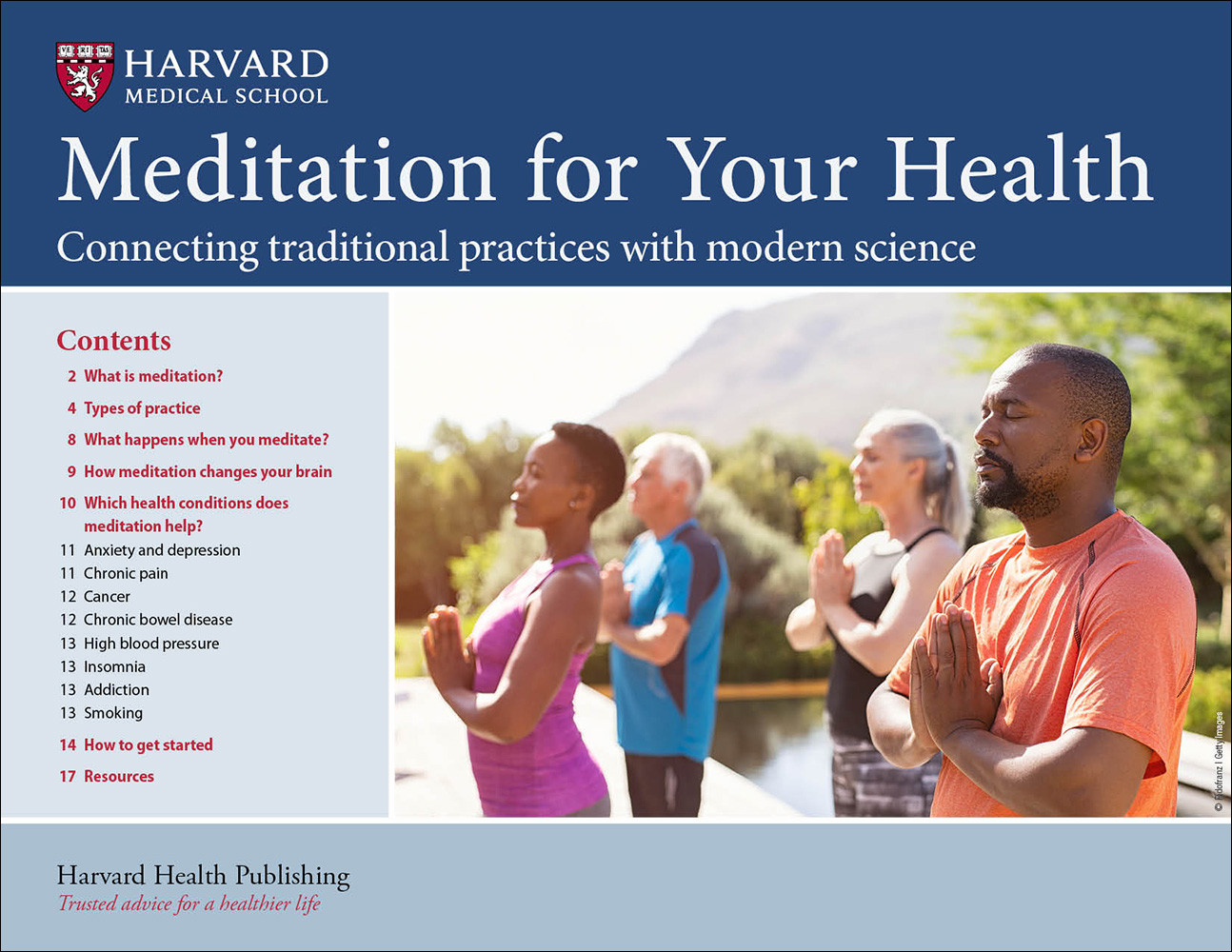Beyond momentary calm
Practicing mindfulness can help you feel more than Zen.
- Reviewed by Toni Golen, MD, Editor in Chief, Harvard Women's Health Watch; Editorial Advisory Board Member, Harvard Health Publishing; Contributor

If one plus one always equals two, why does adding one pile of laundry to another merely equal one (larger) load? The same goes for chewing gum: one wad plus a second just makes a fatter chew.
Notice how these scenarios prompt a mental double-take? A perspective free of assumptions is the fundamental concept behind mindfulness, defined simply as the act of noticing your surroundings and focusing on the present moment. Long known for its ability to tamp down anxiety, mindfulness is similar to the ancient Buddhist practice of Zen meditation, which centers on staying present and nonjudgmental.
"Noticing new things, over time, should teach you what you don't know—that uncertainty is the rule rather than the exception," says Ellen Langer, a professor of psychology in Harvard University's Faculty of Arts and Sciences, who spotlighted the one-plus-one fallacy. Langer — who has been dubbed the "mother of mindfulness" for her four decades of pioneering experiments at Harvard — says mindfulness keeps us alert and open to possibilities rather than chasing every wayward thought.
But extensive research, including Langer's, suggests that mindfulness offers numerous benefits beyond the moment. A host of recent studies indicate these may extend to feeling pain less intensely, making fewer mistakes, and demonstrating more resilience when pursuing challenging goals. "Virtually everything, whether related to body or mind, shows improvement when you're in that space," Langer says.
Mind-body connection
Many people confuse meditation with mindfulness, Langer says. But while there's some overlap, meditation is a means to an end and mindfulness is an end in itself.
"Meditation is a practice you engage in to become more mindful," she says. "Mindfulness is much more immediate. It's a way of life."
Langer's career-defining research on mindfulness has revealed a variety of startling effects. Her famous 1979 "counterclockwise" study involved two small groups of men in their 70s and 80s. Each group stayed for five days in a retreat house retrofitted to evoke the 1950s, when the men were younger. The men in one group were told to reminisce about their past; the others were instructed to live as if they were actually in the 1950s.
The men in both groups showed improvements over baseline in multiple tasks, but those who were told to act as if they were living through those years again showed greater improvements in memory, hearing, vision, gait, and strength levels than those asked to simply reminisce about that time period. "They even looked noticeably younger," she says. "It's the mind-body unity idea: wherever you're putting your mind, you're putting your body."
Fresh findings
Newer research on mindfulness suggests it can also help with the following:
Dampening pain. A study published online July 7, 2022, by the journal Pain suggests mindfulness can decrease suffering by interrupting communication from brain regions responsible for generating pain signals. Twenty adults completed several mindfulness training sessions. They then used the technique while researchers applied a painful level of heat to a spot on their lower leg. The participants rated the intensity of the pain about one-third lower than another 20 participants who went through the same heat challenge but were told merely to rest with their eyes closed. Brain scans conducted during the heat sessions enabled the researchers to track and compare brain activity in the two groups. The scans showed that two areas of the brain involved in pain were less active in participants who practiced mindfulness while painful heat was applied.
Reducing mistakes. A 2019 study in Brain Sciences suggested that mindfulness — in this analysis called "open monitoring" — might help people become less likely to make errors. Researchers measured brain activity in 212 women who had never meditated before. Half completed a 20-minute meditation exercise before taking a computerized "distraction test" of how accurately they could track flashing symbols moving across the screen. The other half took only the distraction test. Brain signals in those who had meditated indicated a stronger ability to avoid distraction test mistakes compared with those who didn't meditate.
Overcoming obstacles. In a study published online March 14, 2022, by the journal Social Psychological Bulletin, researchers asked 121 adults to identify an important personal goal. The participants were divided into two groups. Those in one group performed a mindfulness exercise for 15 minutes, and those in the other group spent 15 minutes reading magazines. All then read scenarios that described an "action crisis," a theoretical but sizable obstacle to achieving their stated goal. The people in the mindfulness group were significantly less likely to say that such a setback would make them give up their pursuit.
Langer says the results reinforce her own earlier findings. "We have much more control over our well-being than people realize," she says. "If you see things differently, you'll feel differently. And you can always see things differently."
Image: © Maskot/Getty Images
About the Author

Maureen Salamon, Executive Editor, Harvard Women's Health Watch
About the Reviewer

Toni Golen, MD, Editor in Chief, Harvard Women's Health Watch; Editorial Advisory Board Member, Harvard Health Publishing; Contributor
Disclaimer:
As a service to our readers, Harvard Health Publishing provides access to our library of archived content. Please note the date of last review or update on all articles.
No content on this site, regardless of date, should ever be used as a substitute for direct medical advice from your doctor or other qualified clinician.














